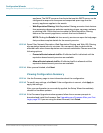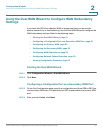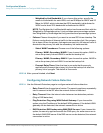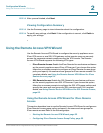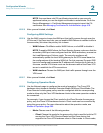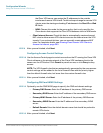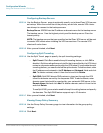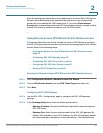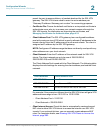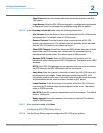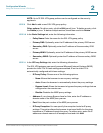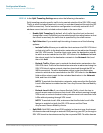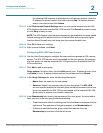
Configuration Wizards
Using the Remote Access VPN Wizard
Cisco ISA500 Series Integrated Security Appliances Administration Guide 58
2
Configuring Backup Servers
STEP 14 Use the Backup Server page to optionally specify up to three IPsec VPN servers
as backup. When the connection to the primary server fails, remote VPN clients
can attempt to connect to the backup servers.
Backup Server 1/2/3: Enter the IP address or domain name for the backup server.
The backup server 1 has the highest priority and the backup server 3 has the
lowest priority.
NOTE: The backup servers that you specified on the IPsec VPN server will be sent
to remote VPN clients when initiating the VPN connections. The remote VPN
clients will cache them.
STEP 15 After you are finished, click Next.
Configuring Split Tunneling
STEP 16 Use the Split Tunnel page to specify the split tunneling settings:
• Split Tunnel: Click On to enable the split tunneling feature, or click Off to
disable it. Split tunneling allows only traffic that is specified by the VPN client
routes to corporate resources through the VPN tunnel. If you enable the split
tunneling feature, you need to define the split subnets. To add a subnet, enter
the IP address and netmask in the IP Address and Netmask fields and click
Add. To delete a subnet, select it from the list and click Delete.
• Split DNS: Split DNS directs DNS packets in clear text through the VPN
tunnel for domains served by the corporate DNS. To add a domain, enter
domain name that should be resolved by your network's DNS server in the
Domain Name field and click Add. To delete a domain, select it from the list
and click Delete.
To use Split DNS, you must also enable the split tunneling feature and specify
the domains. The Split DNS feature supports up to 10 domains.
STEP 17 After you are finished, click Next.
Viewing Group Policy Summary
STEP 18 Use the Group Policy Summary page to view information for the group policy
settings.
STEP 19 Click Next.



